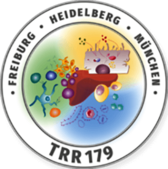
Research-Unit TRR179
Visit website
Welcome to the Department of Molecular Virology at Heidelberg University. We are an interdisciplinary team of virologists, cell biologists, biochemists, and bioinformaticians committed to understanding how viruses replicate, persist, and interact with their hosts. Under the leadership of our new director, Prof. Dr. Mathias Munschauer, the department builds on its long-standing expertise in hepatitis viruses (HBV, HCV, HDV) and flaviviruses (Dengue, Zika), while expanding into the molecular virology of respiratory RNA viruses, including SARS-CoV-2. Our mission is to uncover the fundamental mechanisms of virus–host interactions and immune evasion, and to translate these insights into novel antiviral concepts and strategies.
Research teams in the department investigate how viruses subvert host cell pathways, manipulate innate defense mechanisms, and establish persistent or acute infections. Combining classical virology with advanced technologies, including high-resolution microscopy, functional genomics, proteomics, and computational biology, we take an integrative, systems-level approach to studying viral infections. Through close interdisciplinary collaboration with our partners at the medical campus Heidelberg and beyond, we bring together complementary perspectives to tackle key questions in the field of modern virology and train future virologists to address the complex challenges posed by emerging and reemerging viruses.
As part of Heidelberg University’s Faculty of Medicine and Faculty of Biosciences, the Department of Molecular Virology plays an active role in academic teaching. We contribute to the virology curriculum in medical education and offer lectures, seminars, and practical training to students in the life sciences.
The establishment of the department was made possible through the generous support of the Chica and Heinz Schaller Foundation, which funded the position of the Founding Director, Prof. Dr. Ralf Bartenschlager, for the first ten years and provided essential start-up funding to build the department’s research infrastructure.
March 2026 (17 - 20): 35th Annual Meeting of the Society of Virology
Comments on the COVID-19 pandemic in Germany / Anmerkungen zur Aufarbeitung der COVID-19 Pandemie in Deutschland
The first drug to treat hepatitis delta has recently been approved by the European Medicines Agency (EMA).
The drug is called Hepcludex/bulevirtide, formerly known as Myrcludex B. Hepcludex and has been developed by Prof. Stephan Urban at the research division Molecular Virology in Heidelberg. The drug inhibits the entry of Hepatitis D Virus (HDV) and Hepatitis B Virus into liver cells by blocking the viral receptor. Hepcludex has received provisional approval after very favorable data from two phase 2 clinical trials. This approval makes the drug available to patients suffering from chronic hepatitis D.
It took almost 20 years, starting from the first experiments that aimed at studying virus entry into cells, then realizing the therapeutic potential of using gained knowledge to develop an entry inhibitor until final approval. The drug had been licensed to MYR Pharmaceuticals, which has recently been acquired by Gilead Sciences.

Research-Unit TRR179
Visit website
Research-Unit DZIF
Visit website
Cooperation DKFZ
Visit Website
Cooperation Center for Integrative Infectious Diseases Research (CIID)
Visit Website
Cooperation Canadian Network on Hepatitis C
Visit Website
Cooperation COVIPA
Visit Website